
Bangladesh has raised a renewed call for fair and sustained climate-finance commitments from global partners, cautioning that the country’s acclaimed progress in green garment manufacturing could falter without predictable funding support. The warning was issued during a high-level discussion titled Mobilising Climate Finance to Accelerate the Sustainability Transition of the RMG Sector of Bangladesh: Opportunities and Challenges, held at the Bangladesh Pavilion in the Blue Zone.
Government officials, international climate financiers, and apparel industry leaders told the session that the country’s sustainability transition had reached a “critical inflection point”. Bangladesh is now home to 268 LEED-certified factories— the highest number in the world, according to the BGMEA— yet stakeholders stressed that this advancement must be matched with accessible and equitable financing mechanisms if momentum is to be maintained.
A key concern raised was the imbalance of climate responsibility along the global apparel supply chain. Officials noted that Bangladesh accounts for only 4% of global carbon emissions, yet manufacturers continue to shoulder a disproportionate share of the cost of sustainability. They argued that global brands must take greater responsibility for funding decarbonisation, adaptation, and resilience efforts.
Vidiya Amrit Khan, Vice President of the BGMEA and Deputy Managing Director of Desh Garments Ltd., reiterated that climate finance would define the future competitiveness of the ready-made garment sector. She observed that while factories in Bangladesh had already invested heavily in green technologies and infrastructure, a just transition could not place the financial burden solely on manufacturers. She said manufacturers had demonstrated leadership, but the transition could not rest entirely on factory owners, adding that climate finance was now essential rather than optional.
A BGMEA visual presentation underscored the country’s rapid rise as the world’s most advanced hub for green garment manufacturing, while also warning of a widening financing gap that threatens progress towards national ESG targets for 2030. According to the presentation, achieving these aims will require concessional loans, blended-finance models, brand-side contributions, and access to global climate funds.
AKM Sohel, Additional Secretary at the Economic Relations Division (ERD), told the event that Bangladesh had taken proactive steps to align industrial policy with international climate goals. However, he cautioned that without predictable long-term financing flows, the sector’s sustainability transition risked slowing, affecting both competitiveness and climate resilience.
The session was jointly organised by the ERD, the Institute of Water Modelling (IWM), and the BGMEA, reflecting a coordinated national push to integrate climate policy with industrial strategy.
As global negotiations on climate funding gain urgency, Bangladesh’s message to the international community remains unequivocal: the country that has invested most ambitiously in green manufacturing now requires equally ambitious financial partners to sustain—and expand—its progress.






